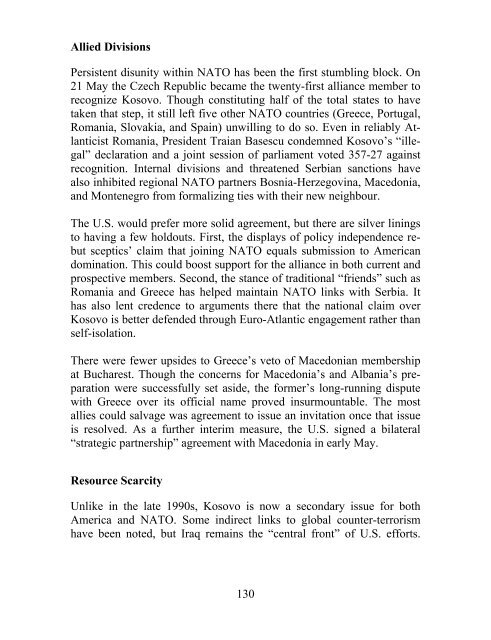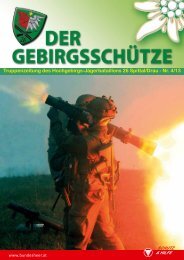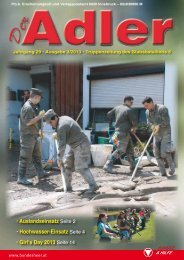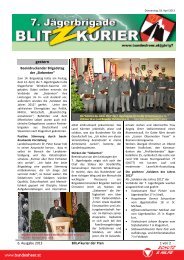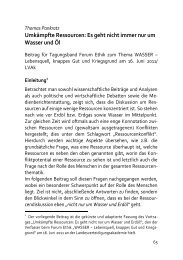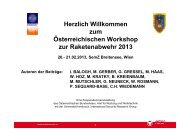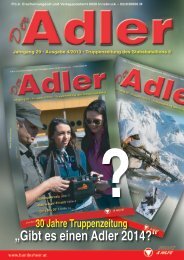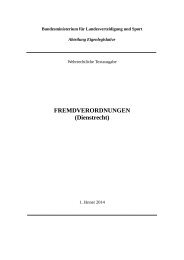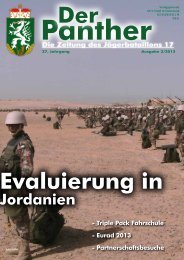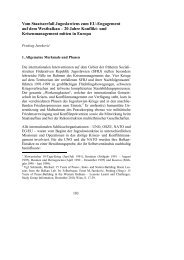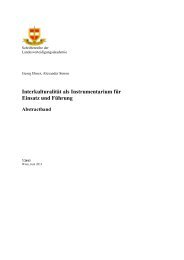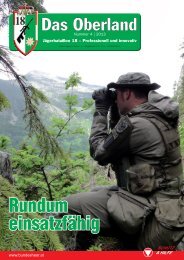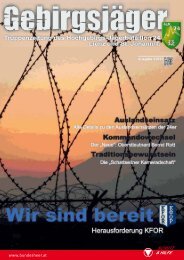Cutting or Tightening the Gordian Knot
Cutting or Tightening the Gordian Knot
Cutting or Tightening the Gordian Knot
Create successful ePaper yourself
Turn your PDF publications into a flip-book with our unique Google optimized e-Paper software.
Allied Divisions<br />
Persistent disunity within NATO has been <strong>the</strong> first stumbling block. On<br />
21 May <strong>the</strong> Czech Republic became <strong>the</strong> twenty-first alliance member to<br />
recognize Kosovo. Though constituting half of <strong>the</strong> total states to have<br />
taken that step, it still left five o<strong>the</strong>r NATO countries (Greece, P<strong>or</strong>tugal,<br />
Romania, Slovakia, and Spain) unwilling to do so. Even in reliably Atlanticist<br />
Romania, President Traian Basescu condemned Kosovo’s “illegal”<br />
declaration and a joint session of parliament voted 357-27 against<br />
recognition. Internal divisions and threatened Serbian sanctions have<br />
also inhibited regional NATO partners Bosnia-Herzegovina, Macedonia,<br />
and Montenegro from f<strong>or</strong>malizing ties with <strong>the</strong>ir new neighbour.<br />
The U.S. would prefer m<strong>or</strong>e solid agreement, but <strong>the</strong>re are silver linings<br />
to having a few holdouts. First, <strong>the</strong> displays of policy independence rebut<br />
sceptics’ claim that joining NATO equals submission to American<br />
domination. This could boost supp<strong>or</strong>t f<strong>or</strong> <strong>the</strong> alliance in both current and<br />
prospective members. Second, <strong>the</strong> stance of traditional “friends” such as<br />
Romania and Greece has helped maintain NATO links with Serbia. It<br />
has also lent credence to arguments <strong>the</strong>re that <strong>the</strong> national claim over<br />
Kosovo is better defended through Euro-Atlantic engagement ra<strong>the</strong>r than<br />
self-isolation.<br />
There were fewer upsides to Greece’s veto of Macedonian membership<br />
at Bucharest. Though <strong>the</strong> concerns f<strong>or</strong> Macedonia’s and Albania’s preparation<br />
were successfully set aside, <strong>the</strong> f<strong>or</strong>mer’s long-running dispute<br />
with Greece over its official name proved insurmountable. The most<br />
allies could salvage was agreement to issue an invitation once that issue<br />
is resolved. As a fur<strong>the</strong>r interim measure, <strong>the</strong> U.S. signed a bilateral<br />
“strategic partnership” agreement with Macedonia in early May.<br />
Resource Scarcity<br />
Unlike in <strong>the</strong> late 1990s, Kosovo is now a secondary issue f<strong>or</strong> both<br />
America and NATO. Some indirect links to global counter-terr<strong>or</strong>ism<br />
have been noted, but Iraq remains <strong>the</strong> “central front” of U.S. eff<strong>or</strong>ts.<br />
130


